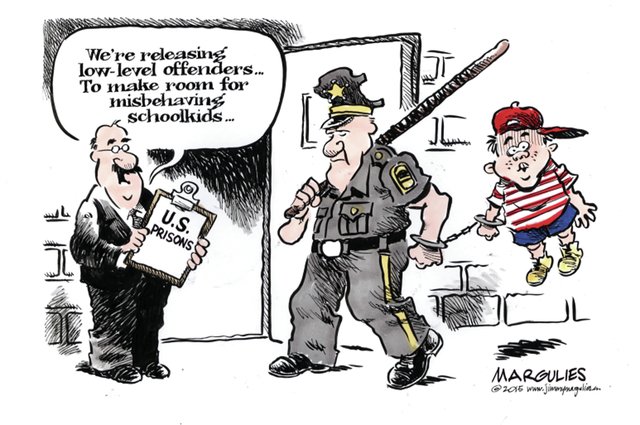A scuffle in the hallway or graffiti on a row of lockers used to send scofflaws to the principal’s office for a stern talking-to. Today, those same adolescent iniquities are likely to land kids in jail.
Zero-tolerance policies and an increasing reliance on law enforcement to investigate what used to be simple disciplinary matters have created what civil liberties watchdogs call the school-to-prison pipeline. A troubled student is nearly as likely to leave campus with a rap sheet as with a high school diploma.
Here in Richmond County, forward-thinking judges and prosecutors are working to plug the pipeline and give youthful offenders a chance to turn their lives around.
With the first mock trials held last week in the old Richmond County Courthouse, teen court is now in session. The diversion program allows students who have pleaded guilty to low-level offenses to be sentenced to community service or teen court participation by their peers.
As long as respondents successfully complete the teen court requirements, their crimes don’t result in the creation of a grownup criminal record that will haunt them for years, serving as a barrier to military service, higher education and employment.
“I like what I saw,” said Richmond Senior High School Principal Keith McKenzie, who sat in on the first mock trials. “I think it’s honestly another avenue to try and help our youth make good decisions but also give them an option in making a learning situation where there’s not as much consequences for first offenders.”
Perhaps it’s fitting that one of the first mock trials involved a 13-year-old being sentenced for marijuana possession. The war on drugs has swept an alarming number of teens into jail and probation.
We warn our youth that drug abuse can ruin their lives, and the first time curious teens are caught experimenting, we saddle them with a permanent criminal record that, well, ruins their lives. Call it the ultimate self-fulfilling prophecy.
Teen court stresses education and intervention over punishment for punishment’s sake. Respondents learn about due process and criminal justice in a lower-stakes atmosphere. They also learn that their actions carry consequences — punishments can include up to 20 hours of community service and mandatory participation on future teen court juries.
Zero-tolerance policies that require harsh punishments and fail to take specific circumstances into account have not made our nation’s schools safer. They result in overzealous arrests, like when a Florida sixth-grader was charged with a felony for having a plastic butter knife in her backpack.
In this day and age of school shootings and bomb threats, we’re glad to see school resource officers patrolling the hallways. However, we caution teachers and administrators against calling in the cops for simple matters of school discipline. Breaking a rule and committing a crime are not the same thing.
Programs like teen court give students who have gone astray a chance to correct their behavior and avoid a lifetime of consequences for youthful mistakes. We call on local law enforcement, school officials and community members to lend their full support.

